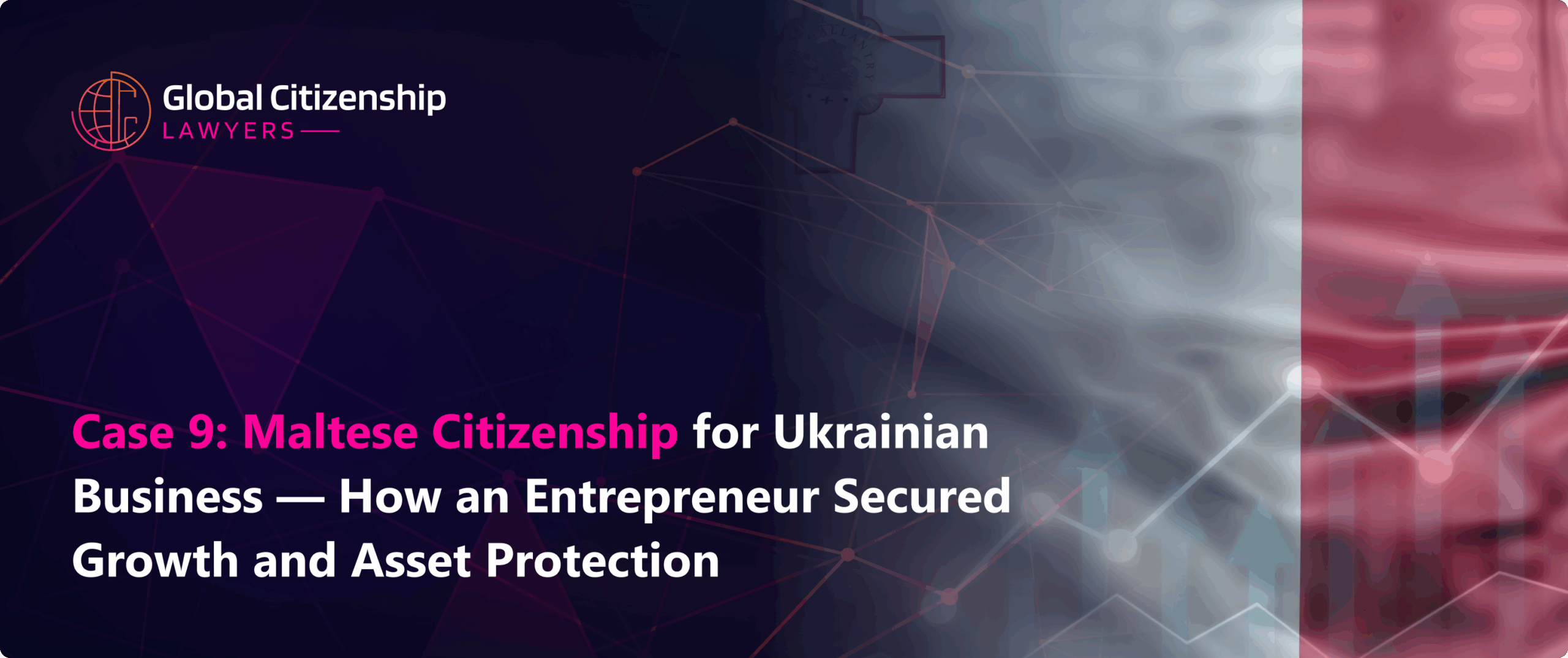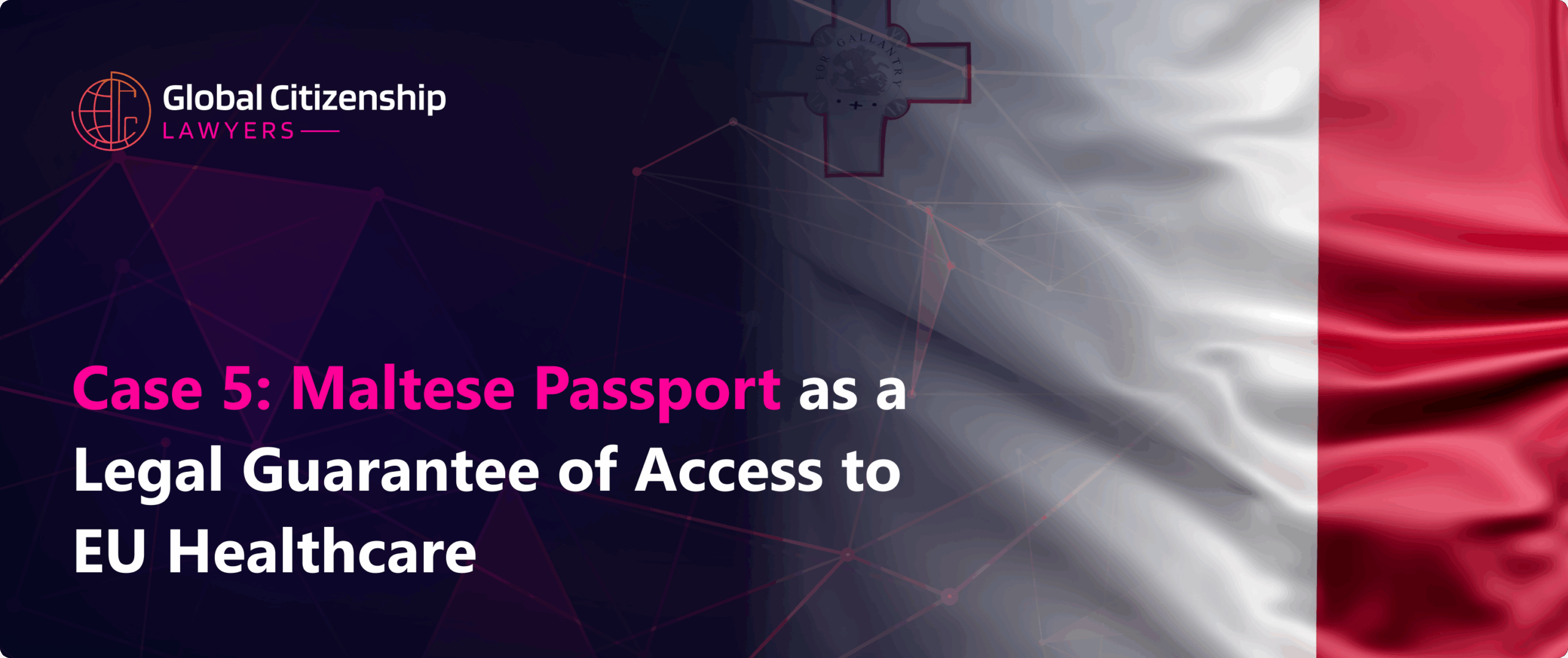Malta Citizenship: A Complete Guide to Obtaining, Programs and Benefits
Malta is more than just a picturesque island in the Mediterranean. It is a country with one of the most prestigious citizenship programs in the EU. Maltese citizenship opens the door to 180+ countries without a visa, grants the right to live, work and study anywhere in the European Union, and also provides stability, security and access to beneficial tax planning.
Under Malta Citizenship by Naturalisation for Exceptional Services by Direct Investment, you can obtain citizenship by investment in a formal, legal and transparent manner. The program requires a contribution to the National Development Fund, the purchase or lease of real estate, a voluntary donation to an approved charity. Want to know if Malta citizenship is right for you? Contact our lawyers for a personal consultation. We will assess your situation in detail, help you collect documents, organize full application support and ensure legal security at every stage.
Why choose Maltese citizenship?
The Malta passport grants its holder the status of a citizen of the European Union. It is not just a convenient travel document, but a legally justified access to all the basic rights and freedoms provided for EU citizens. The Maltese passport grants the right to live, work, and study in any EU country, is recognized in more than 180 countries of the world, and provides a high level of consular and legal protection. Citizenship is inherited, which makes it a profitable long-term investment in the future of the family.
Malta is a full member of the European Union and the Schengen Area. This gives its citizens the unique freedom to travel visa-free throughout the Schengen area, freely open a business in any EU country, buy real estate, invest, receive medical and social services in other EU countries, participate in tenders and public contracts in the EU.
Malta offers investors a stable and competitive tax system. Key benefits:
- No tax on worldwide income provided it is not remitted to Malta;
- No inheritance or gift tax;
- Preferential tax treatment of dividends, interest, and royalties;
- Transparency and compliance with EU and international standards.
The Maltese passport gives you visa-free travel to over 180 countries worldwide, including all Schengen countries, the UK, Canada, Japan, Singapore, South Korea, and many Latin American and Caribbean countries.
Malta boasts one of the most effective and accessible healthcare systems in Europe. Public and private hospitals offer high-quality medical services, including prevention, treatment, and rehabilitation programs. There are also international schools and universities on the island with English-language education. Malta is listed among the safest countries in Europe, has a stable banking system, and provides political and economic stability.
All legal ways of acquiring Maltese citizenship
Malta Citizenship by Investment (MEIN)
Malta offers one of the few citizenship by investment programmes in the EU, the Maltese Exceptional Investment Naturalisation, which operates under the Citizenship by Naturalisation for Exceptional Merit Regulations (LN 437 of 2020).
Basic conditions to acquire Malta citizenship through this investment program include:
- Non-refundable contribution to the National Development Fund: €600,000 (naturalization after 36 months) or €750,000 (naturalization after 12 months).
- Donation to a charity: minimum €10,000;
- Rent of real estate (from €16,000 per year) or purchase (from €700,000) with mandatory retention for 5 years;
- It is mandatory to have a Maltese residence permit before applying for citizenship.
All applicants undergo a rigorous multi-stage due diligence process. The Malta Citizenship by Investment program is limited in number (maximum 400 applications per year) and requires the support of a licensed agent.
Naturalization by residence
This is the standard route available to persons residing in the country based on the Malta permanent residency program. The basis is regulated by Chapter 188 of the Laws of Malta.
Conditions of obtaining Malta citizenship through naturalization include:
- Minimum 5 years residence in Malta, including 12 months of continuous residence before application;
- Having permanent resident status;
- Proof of integration: knowledge of English or Maltese, involvement in local life, no problems with the law.
Citizenship by origin (repatriation)
Children born to a Maltese parent or with Maltese grandparents may be eligible for citizenship by descent. This Malta citizenship program also applies to persons born in Malta before 21 September 1964 or before 1 August 1989 to parents who were citizens of Malta.
Malta citizenship eligibility by origin requires:
- Proof of relationship through birth/citizenship documents;
- Personal presence at the submission of documents;
- No residency or investment requirements
Citizenship through marriage to a citizen of Malta
Marriage to a Maltese citizen may be the basis for obtaining citizenship, but not immediately. Application is possible 5 years after the marriage (or 3 years if cohabiting in Malta).
Conditions to acquire citizenship include:
- Legally registered marriage;
- Maintaining the relationship at the time of filing;
- No criminal record, proof of integrity.
Important: Marriage alone does not guarantee a passport. The process requires proof of a stable relationship and full integration.
Exceptional merits and humanitarian grounds
Rare but possible cases of granting citizenship to individuals who have made a special contribution to Malta: in science, culture, sport, diplomacy, or for humanitarian reasons.
Examples:
- Famous sportsmen who have represented Malta on the international stage;
- Scientists or artists who have contributed to the cultural or economic reputation of the country;
- Stateless persons rescued in Malta.
Applications are considered individually. The decision is made by the President on the recommendation of the Maltese government.
Citizenship by Investment Programme (Malta MEIN)
The Maltese Exceptional Investment Naturalisation Programme is an official scheme approved by the Government of Malta in 2020 (LN 437 of 2020) that allows foreign investors to acquire EU citizenship through investment in the country’s economy, subject to strict conditions and a multi-layered check.
The applicant must be of legal age, financially sound, and of impeccable character. He/she must not have a criminal record or be subject to international sanctions. In addition, the foreign investor must demonstrate a genuine intention to establish a connection with Malta, including renting or purchasing a home in the country.
The candidate must fulfill 3 financial obligations:
- Non-refundable donation to the National Development and Welfare Fund (Community Malta Agency);
- Renting or buying property in Malta;
- A charitable contribution to a government-approved non-profit organization.
The Malta citizenship application process, by making an exceptional direct investment, includes several stages:
- Primary verification (eligibility check);
- Applying for a Malta residence permit (usually within 2-3 months);
- The period of mandatory residence in the status of a resident (12 or 36 months);
- Final application for citizenship after the minimum period has expired.
- Final approval and oath.
Average duration of the entire process: from 12 to 36 months, depending on the amount of the donation.
This Maltese citizenship program allows for the inclusion of a spouse, minor children, and children under 29 years of age if financially dependent. It also includes the applicant’s parents or spouse if they are dependent, as well as family members with disabilities if they have supporting documents.
The Malta Citizenship by Investment program operates under the Maltese Citizenship Act (CAP 188) and Regulation LN 437/2020. All procedures are carried out through the authorized agency Community Malta Agency. A strict legal framework and government control ensure reliability and legality. All applicants undergo a four-level due diligence check. This is one of the strictest systems in the world.
Malta restricts participation by citizens of certain countries. These generally include persons born in or holding citizenship of the following countries: Afghanistan, North Korea, Iran, Syria, and certain other countries under international sanctions.
Maltese law provides for the protection of applicants’ personal data. The application process is closed and processed through a licensed agent. Information about citizenship recipients is not subject to publication, except in cases provided by law.
If you are considering obtaining Maltese citizenship by investment, our team of lawyers is ready to provide full support: from choosing a strategy to obtaining a passport. Contact us for an initial consultation and assessment of your chances.
Requirements, documents, and application process
The set of documents required for the Malta investor programme must be prepared in English and include:
- A certified copy of your passport;
- Birth and marriage certificates;
- Certificates of no criminal record from all countries where the applicant has lived for more than 6 months;
- Confirmation of the source of income and the legality of capital;
- Health declarations;
- Documents confirming the address of residence;
- Global health insurance coverage valid in EU countries.
- Signed forms issued by the licensing agent.
Each document undergoes strict authentication and, if necessary, is apostilled.
Malta has one of the most stringent due diligence systems in the world. Community Malta conducts a multi-stage due diligence, including checking international databases (sanctions, terrorism, criminal cases), financial audit and analysis of sources of income, background investigation of business reputation, and possible links to risky sectors, interviews with the applicant and his/her family members. The presence of suspicious transactions, conflicts of interest, or hidden assets may result in refusal even if all formal requirements are met.
An interview with the applicant is mandatory. It is conducted by representatives of the Community Maltese agency (in person or via video link). The interview aims to confirm personal data and biographical information, checking the motivation for obtaining citizenship, establishing the applicant’s connections with potentially risky jurisdictions, and determining the degree of integration into Maltese society. The interview is conducted in English. The presence of an interpreter is possible, but may be perceived as a factor indicating a weak connection with Malta.
The procedure takes from 12 to 36 months, including a 12-month residence period before the main application is submitted. The total cost of participation is:
- €600,000 – non-refundable contribution to the National Fund for 36 months (or €750,000 if applying after 12 months);
- €10,000 – charitable donation;
- €7,000 – rental of housing (minimum 5 years) or purchase of real estate worth €700,000;
- €15,000–€20,000 – administrative and legal fees per person;
- Additional costs for including family members.
Malta does not tax income unless it is received in the country, and there is no tax on inheritance, dividends or capital gains tax from abroad.
By law, an application for citizenship by investment can only be submitted through an accredited licensed agent approved by the Community Malta Agency. Independent applications are not considered. The agent is responsible for preparing and checking the package of documents, submitting the application, communicating with the authorities, and accompanying the client at all stages: from renting a property to the final receipt of the passport.
Our law firm has experience in handling cases under the MEIN program and cooperates directly with licensed agents. We offer a full legal check before submission, preparation of all documents in accordance with the Community Malta Agency requirements, control over deadlines, and interaction with Maltese government, support at all stages: from registration of the residential address to obtaining a certificate of naturalization.

Common Difficulties and How to Avoid Them
Most of the difficulties at the early stage are related to the preparation of an incomplete or incorrect set of documents. Typical mistakes:
- Providing invalid certificates of no criminal record (for example, expired or without an apostille);
- Inaccuracies in birth, marriage, or divorce documents;
- Discrepancies between addresses and personal data in different documents;
- Lack of legal confirmation of sources of income.
Even a minor inaccuracy can lead to the suspension or return of the citizenship application. The MEIN program requires impeccable legal purity and transparency of all information about the applicant and his family members. Preparation of documents under the supervision of lawyers and verification of each position before submission eliminates the risk of a technical refusal at the preliminary stage.
Community Malta carries out a multi-stage due diligence process. The most common reasons for refusal are:
- Connections to jurisdictions under international sanctions;
- Participation in legal proceedings, even if the charges did not result in a conviction.
- Public activities that pose reputational risks to the state;
- Discrepancies between declared income and actual standard of living;
- Dishonest agents or consultants submitting citizenship applications with false information.
Increasingly, refusals are not related to gross violations, but to insufficient disclosure of information that raises suspicions about the applicant’s intentions. A professional audit before submission is one of the key tools for minimizing risks. Our lawyers conduct an internal review of the dossier according to the same parameters as a government agency.
Applicants often underestimate the commitments that participation in the program entails. Potential problems include:
- Selecting the wrong type of property (e.g., in the wrong region or with insufficient market value);
- No consideration of the tax implications of owning assets in Malta;
- Incorrect international ownership structure of companies can cause problems when verifying sources of income.
Financial planning is a must, especially for applicants with international assets and businesses. We advise clients on tax aspects related to the MEIN program, including CFC issues, offshore holding structures, and possible CRS exchange.
If the Maltese citizenship application has been rejected, it is important not to panic and act strictly within the legal framework. Options: filing an appeal through a licensed agent, collecting additional evidence of reliability or sources of income, re-applying with corrected data.
Sometimes it is wiser to abandon the re-attempt and consider alternative jurisdictions if the analysis shows that the original data does not meet the expectations of the Maltese authorities. We analyze the reasons for the refusal, draw up a response strategy, and, if necessary, accompany the client during the appeal or change of jurisdiction.
Comparison with other EU programmes
The main advantage of Malta is the opportunity to obtain citizenship, not a temporary or permanent residence permit. The MEIN program allows you to obtain a full European passport within 12-36 months, and not just a Maltese residency card. This is the key difference from the programs in Greece, Portugal, or Spain, where citizenship can only be obtained after 5-7 years of residence.
The MEIN program is regulated by the Malta Civil Act and is officially approved by the government. It operates through licensed agents, and the application process includes a multi-layered due diligence process to ensure legal clarity and protection from future disputes.
In contrast, Cyprus’s program was suspended in 2020 after criticism from the European Union, with a number of applicants facing reconsideration or even revocation of citizenship. Portugal’s “golden visa” program was significantly curtailed in 2023, particularly in the real estate sector, with citizenship only possible after years of residency. Similarly, Greece only offers residency, with no clear guarantee of progression to citizenship.
How can we help you?
We begin with a comprehensive consultation to determine whether the immigrant investor program route is right for you or whether there are alternative grounds: naturalization, descent, marriage, or exceptional merit. Our lawyers assess all legal and financial aspects and help you choose the best strategy.
The Malta MEIN application process involves several mandatory steps: due diligence, interviews, signing investment agreements, meeting donation, rental, or purchase requirements, and paying fees. We guide you through each step, ensuring your documentation is up to date and liaising with licensed agents authorised to apply on your behalf.
Malta offers an attractive tax system, especially for new citizens. We assess potential risks and develop individual tax strategies to ensure full compliance with the laws of Malta and other jurisdictions related to your asset structure. Our experts will help to avoid double taxation and ensure legal transparency of all transactions.
If you have previously been denied participation in the Malta citizenship by investment program or have encountered administrative difficulties, we are ready to take on the resolution of complex cases. We analyze the reasons for refusal, draft appeals, and obtain reconsideration of applications, relying on experience in international migration cases.
Our work does not end with the issuance of a Malta passport. We continue to support you after becoming a Maltese citizen, providing legal support on taxation issues, family registration, health insurance, children’s educational rights, and other issues related to living in Malta or other EU countries.
Ready to take the first step towards European citizenship?
Contact our team right now and get a personal strategy that takes into account your goals, assets and international tax situation. We will provide full control at all stages and will lead you to the desired result.

FAQ
MEIN (Maltese Exceptional Investment Naturalisation) is the official Maltese programme that allows one to obtain citizenship based on significant investment in the country’s economy. The programme is regulated by special legislation and is carried out through licensed agents. It is the only legal form of obtaining Maltese citizenship by investment.
Yes, the MEIN program allows immediate family members to be included in the application: spouse, children (including adults under 29 if financially dependent), and parents and grandparents over 55 if financially dependent on the principal applicant. Each family member must undergo a separate due diligence process.
The citizenship process takes 12-18 months from the date of application. This includes eligibility assessment, due diligence, meeting investment obligations, residing in Malta for at least 12 months and final naturalisation with the issuance of a passport.
Yes, Malta accepts dual citizenship. You can keep your original passport if your country’s laws also allow it. However, it is recommended to consult a lawyer before applying to rule out any possible legal risks or conflicts of jurisdiction.
Tax liability is not based on citizenship, but on tax residency. Unless you become a tax resident of Malta (i.e. you do not reside there for more than 183 days a year), you are not liable to pay taxes on your global income. However, even tax residents of Malta can benefit from a favourable system: there are no taxes on inheritance, gifts, foreign capital gains and no net wealth tax.


